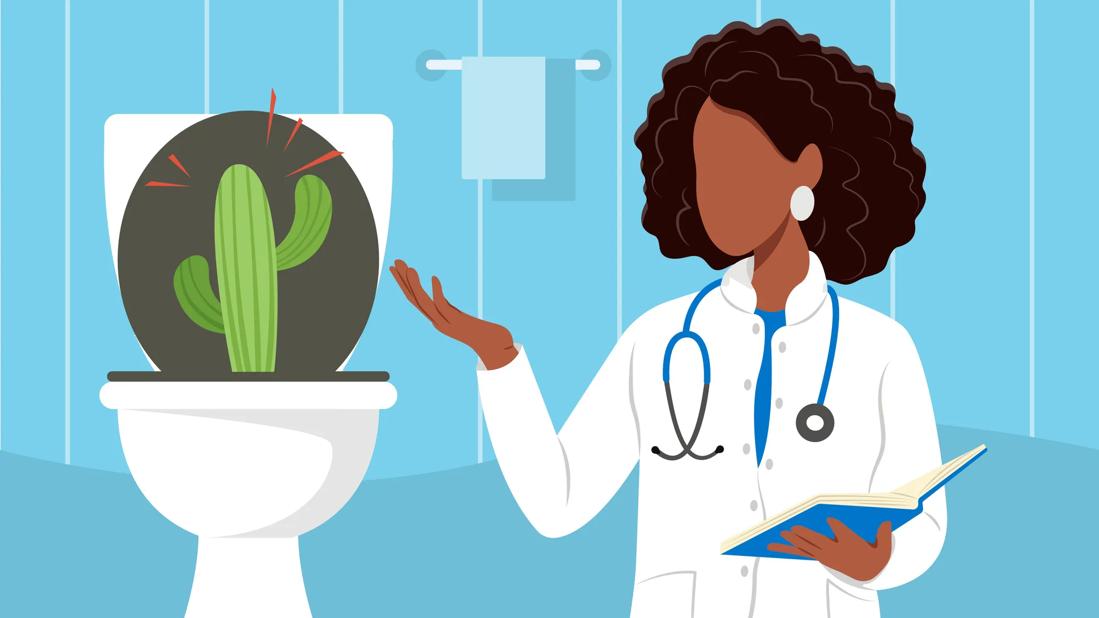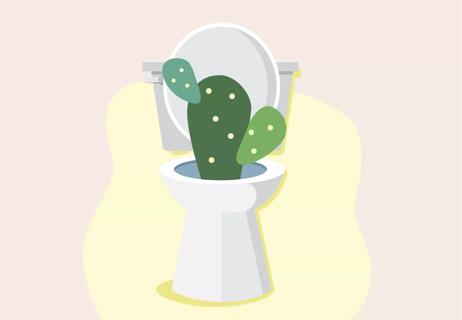Try sitting in a sitz bath or taking psyllium husk to help relieve symptoms

If you have hemorrhoids, you know all too well that the itchiness, rectal bleeding and hard lumps that are sore and tender can make it challenging to sit comfortably and go about your daily life.
Advertisement
Cleveland Clinic is a non-profit academic medical center. Advertising on our site helps support our mission. We do not endorse non-Cleveland Clinic products or services. Policy
And if you’re tired of running to the local pharmacy every time you need some relief, you might want to consider trying some home remedies for hemorrhoids instead.
Natural remedies for hemorrhoids have proven to help shrink them down, but make sure you’re informed before you start treating these unpleasant guests at home.
“First, realize that hemorrhoids are a normal part of our anatomy. Usually, they don’t cause pain,” says colorectal surgeon Jeremy Lipman, MD.
Dr. Lipman says that any change you notice around your anus should prompt an exam by a doctor to make sure nothing more serious is going on — especially if you see blood.
Once you’re sure the symptoms are from hemorrhoids, there are many ways you can try to treat them at home. But what works? And what doesn’t?
Before we move forward, know that popping a hemorrhoid can lead to severe bleeding, swelling and even infection.
The goal instead? To reduce or shrink the size of your hemorrhoids and manage your symptoms.
Dr. Lipman shares how to get rid of hemorrhoids at home and when it may be time to see a doctor.
Before you try hemorrhoid relief at home, proper diagnosis is critical.
“It’s important to see your doctor for bleeding, especially if you have never had hemorrhoids before,” Dr. Lipman advises.
Advertisement
It’s after you’re properly diagnosed that you can start exploring how to heal hemorrhoids with these home remedies.
Generally, experts recommend people with painful hemorrhoids sit in warm water for 15 minutes, several times a day — especially after a bowel movement.
A sitz bath for hemorrhoids is generally available at a local pharmacy. This small bowl fits right over your toilet and offers a convenient way to soak and soothe the area. You can also just sit in a bathtub filled with warm water.
“This is one of the best treatments,” states Dr. Lipman.
Psyllium husk is a supplement that helps increase your fiber intake and softens stools to make them easier to pass. Be careful not to increase fiber too much, too quickly, as it may also cause gas or stomach cramping.
“Use this to soften stool and make bowel movements more regular,” explains Dr. Lipman. “When your stools are soft and easy to pass, your hemorrhoids are more likely to resolve. Be sure to drink plenty of water if you take this supplement.”
If home remedies aren’t providing relief, look for medications that contain lidocaine or hydrocortisone to help manage symptoms. These can help with swelling and relieve burning, itching and pain. Options include creams, ointments, suppositories and medicated wipes.
You may also consider taking nonsteroidal anti-inflammatory drugs (NSAIDs) for pain and inflammation.
“To get the best effect, apply over-the-counter medicines right after doing a sitz bath,” recommends Dr. Lipman. “If the symptoms are getting worse, or not getting better in a few days, you should see your doctor.”
Some people say that apple cider vinegar can bring instant relief to hemorrhoids, reducing itching and pain.
“I don’t recommend using this remedy as it may burn the skin with overuse and exacerbate problems,” cautions Dr. Lipman.
Additionally, some people say the antiseptic and anti-inflammatory properties of tea tree oil may reduce swelling and itching caused by hemorrhoids. Some early research found that a gel made with tea tree oil decreased symptoms, but studies are lacking. Dr. Lipman recommends not trying this remedy, as it isn’t well studied.
You may also think aloe vera may help soothe hemorrhoid inflammation, as research shows its benefits for other inflammatory skin conditions. But Dr. Lipman doesn’t recommend using aloe vera, as there isn’t research available for its use specifically on hemorrhoid relief.
In most cases, your hemorrhoids should go away on their own without treatment. But you should see a healthcare provider if:
Advertisement
Your doctor may suggest the following medical treatments:
Again, hemorrhoids are no fun. And while they’re typically harmless, there are a few things you can do to help prevent them:
If you have questions on how to shrink hemorrhoids, don’t hesitate to talk to a doctor.
“If your hemorrhoids are stopping you from doing the things you want, go see your doctor to talk about options,” advises Dr. Lipman.
Advertisement

Sign up for our Health Essentials emails for expert guidance on nutrition, fitness, sleep, skin care and more.
Learn more about our editorial process.
Advertisement

Avoid making your symptoms worse with these tips

The caffeine and natural acids in coffee may trigger acid reflux, but there are ways to lessen the effects

Wait a few hours, then start with water or ice chips, graduating to clear liquids and then, soft, bland foods

Eating a healthy diet, reducing stress, and focusing on exercise and sleep can help keep your digestive system in top form

This spinning sensation is a symptom, not a condition, so you need to know what’s causing it before you can treat it

Making lifestyle changes can help reduce your blood pressure, but taking cinnamon supplements probably isn’t one of them

At-home treatments and lifestyle changes may help ease the symptoms and improve the appearance of varicose veins — but they aren’t a cure

People with an inflamed esophagus may also have other conditions that cause a nagging, persistent cough

Even small moments of time outdoors can help reduce stress, boost mood and restore a sense of calm

A correct prescription helps your eyes see clearly — but as natural changes occur, you may need stronger or different eyeglasses

Both are medical emergencies, but they are very distinct events with different causes